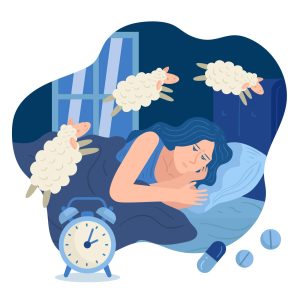When is sleep medication required?

Stress, anxiety and mental health conditions can cause a disruption to a person’s sleep pattern and result in the individual having difficulty in getting to sleep or even staying asleep. This condition is classed as insomnia and is the most common type of sleep disorder. There is no specific definition in terms of the number of hours of lost sleep that define insomnia as the amount of sleep that is needed varies from person to person. However insomnia is usually diagnosed if a person has difficulty falling asleep or staying asleep for at least 3 nights a week.
Chronic insomnia is defined as a disruption to a sleep pattern for extended periods of time. It will possibly require medication prescribed by the GP and therapy to identify the hidden cause or to process a known situation that may, for example, be causing anxiety that is the cause of the insomnia symptoms. It is important to realise that just treating the condition with medication but not processing the cause is not helpful and usually there needs to be a combination of both for an effective outcome.
The importance of Cognitive Behavioural Therapy (CBT) for sleeplessness
A very successful and clinically recognised form of therapy that is used in conjunction with prescribed medication is Cognitive Behavioural Therapy or CBT. CBT is based on the concept that five areas, namely, situations, thoughts, emotions, physical feelings and our actions are interconnected which can result in each of them affecting each other. For example, imagine that there is a certain situation that dominates your thoughts. This will in turn affect how you feel both emotionally and physically. It will lead to (usually negative) action in response which will feed into the cycle. CBT therapy aims to stop negative thought cycles by therapeutically breaking down the things that make us feel guilty, angry, anxious, depressed or frightened into more mentally manageable chunks to help us change our negative thought processing and improve the way we feel.
Medication prescribed for sleeplessness
For many years, benzodiazepines such as Diazepam and Librium were commonly prescribed to assist with sleep. These are a type of sedative medication which means that they slow down the body and brain functions. They should be prescribed for short term use only due to the dangers of the addictive properties of the drug and the ability of the body to build up a tolerance to the drug resulting in the need to take higher doses to get the same effect. The problem can be that for some people, the GP has not renewed the prescription and they then choose to access the same medication from an illegal source off the internet. This will undoubtedly lead to an addiction to sleeping tablets and a worsening mental condition.
Because of the adverse side effects from Benzodiazepines, other drugs known as Z drugs, are more commonly prescribed for sleeplessness. One of these is Zopiclone which, since the 1980s, has been recognised as a safer alternative to prescribing a benzodiazepine. However, it is still for short term use only and should be prescribed in conjunction with recommended CBT therapy. Zopiclone helps you fall asleep more quickly and also helps you to stop waking up during the night. Zopiclone works by stimulating a calming chemical in the brain called Gamma aminobutyric acid. It is taken orally in tablet form in a dose of either 3.75 or 7.5mg daily. It was initially hailed as a wonder drug but it did not take long for it to be shown to have similar addictive properties to Benzos. It is now classified as a Class C controlled drug.
The newest drug that can now be prescribed by a GP for insomnia, since it was medically approved in the UK in 2023, is Daridorexant or Quviviq. Daridorexant is classed as an orexin receptor antagonist. This medication works in a different way to other prescribed sleeping medications as it blocks the action of certain natural substances called Orexin in the brain which cause us to wake up and not go back to sleep. The important factor of this medication is that in medical trials it has shown to have less potential for a dependence or addiction – or even a body build-up of a tolerance for the drug – meaning that it can be safely prescribed for longer periods of time. It is available in tablet form in a dose of 25mg or 50 mg and is a relatively expensive drug at about £42 for a pack of 30 tablets.
Daroxident (Quvivic) can produce similar side effects as other prescribed medication for sleeping or insomnia such as drowsiness, decreased awareness and alertness. For a few it may have more serious side effects, worsening depression or suicidal ideation. It is therefore vital that talking therapy takes place alongside taking the medication.
If you have an issue with addiction to prescribed sleeping medication, please contact The Haynes Clinic on 01462 851414.
